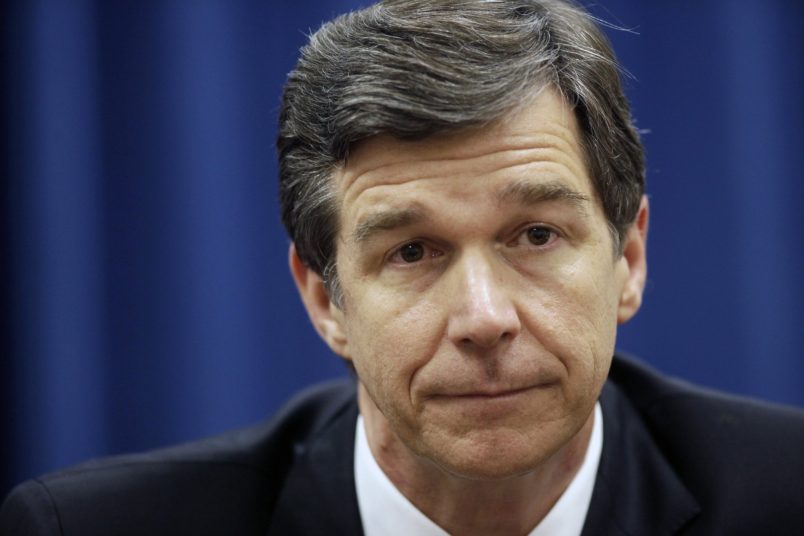RALEIGH, N.C. (AP) — With Republicans’ veto-proof majority ending in days, the North Carolina legislature on Thursday overrode the Democratic governor’s veto of legislation that would keep campaign finance investigations confidential and allow the GOP to possibly dump their nominee in a still-undecided U.S. House race marred with ballot fraud allegations.
The override would require new primaries as well as a general election in North Carolina’s 9th Congressional District if the ongoing state elections board investigation into suspected ballot fraud forces new voting.
The elections board is scrutinizing mail-in absentee ballots in the race, where Republican Mark Harris leads Democrat Dan McCready by 905 votes. The new law means both could be forced to compete for their parties’ nominations again.
Democratic Gov. Roy Cooper said last week he vetoed the measure because it would also force the state elections board to keep its campaign finance investigations confidential and have a separate commission secretly review whether prosecutors are notified.
“We know that we live in a period of time where the public is asking for its politicians to have an increased level of transparency. They want to know more about what goes on in our business than they ever have before,” said Rep. Graig Meyer, an Orange County Democrat.
Republican State Rep. Sarah Stevens countered that the legislation doesn’t shield politicians any more than other criminal investigations that aren’t disclosed until evidence supports charges.
“People ought to be able to have the opportunity to offer their side before it simply is made public on someone’s allegation,” she said. “It’s just about giving a little time to give everything a fair treatment. This is not about covering up something.”
After overriding the election bill and a second measure that reaffirms the ability of four Charlotte-area municipalities to run their own charter schools, the Republican-dominated General Assembly then closed its two-year session. The GOP holds veto-proof majorities in both chambers until Dec. 31.
The election law’s multiple provisions also ends a two-year power struggle between Cooper and GOP legislators over elections board control. In 2016, the Legislature voted to upend a law that for a century had given the governor and his or her political party the majority on local and state boards that oversee elections. Cooper sued and eventually won. The legislation largely returns elections, ethics enforcement and lobbyist reporting to how they were before Republican lawmakers changed them just before Cooper took office.
Though the elections board investigates potential crimes involving election laws, it doesn’t have the power to take a case to court and must instead provide its findings to federal or state prosecutors. They can elect to pursue criminal charges or drop a case, often without explanation.
Despite that, several North Carolina politicians have served prison time for hiding who was financing their elections or for using donations as their personal piggybanks. Former state Sen. Fletcher Hartsell was sentenced to eight months in prison last year because the 26-year Republican lawmaker spent more than $200,000 in campaign funds on vacations, speeding tickets, haircuts and theater tickets.
The state elections board opened nearly 100 campaign finance cases this year and continued to investigate additional cases from previous years, spokesman Pat Gannon said. Only one was referred to criminal prosecutors.
In October, the elections board provided the Mecklenburg County district attorney with findings that Democratic Rep. Rodney Moore of Charlotte and his campaign didn’t report and may have tried to hide more than $140,000 he received or spent.
The law’s secrecy provision could backfire against politicians since people would be free to describe filing complaints alleging serious violations, but the state elections board would be forbidden from disclosing what investigators actually found, said Bob Hall, a longtime North Carolina campaign finance watchdog.
The bill’s confidentiality requirement “will cause innocent political figures to remain under a cloud of suspicion, and it will allow guilty political figures to escape punishment by having their cases secretly referred to local prosecutors who can simply ignore them,” Hall wrote in an email to legislators on Thursday.







“People ought to be able to have the opportunity to offer their side before it simply is made public on someone’s allegation,” she said. “It’s just about giving a little time to give everything a fair treatment. This is not about covering up something.”
bookmarking
“The law’s secrecy provision could backfire against politicians since people would be free to describe filing complaints alleging serious violations, but the state elections board would be forbidden from disclosing what investigators actually found, said Bob Hall,”
LOL…guess what the NC GOP plans to line people up around the block to do to Dems. Guess.
How could this law possibly pass Constitutional muster? When Congress gets into a bind are they allowed to pass a law to apply retroactively to the current situation?
NC Republicans: “Move along, nothing to see here.”
The requirement to hold new primaries might run afoul of the Constitution. The law also veils the investigation, which may not be in the past, but, I’ll be surprised if that part isn’t challenged in court for violating some state-level public record or FOIA-type law.